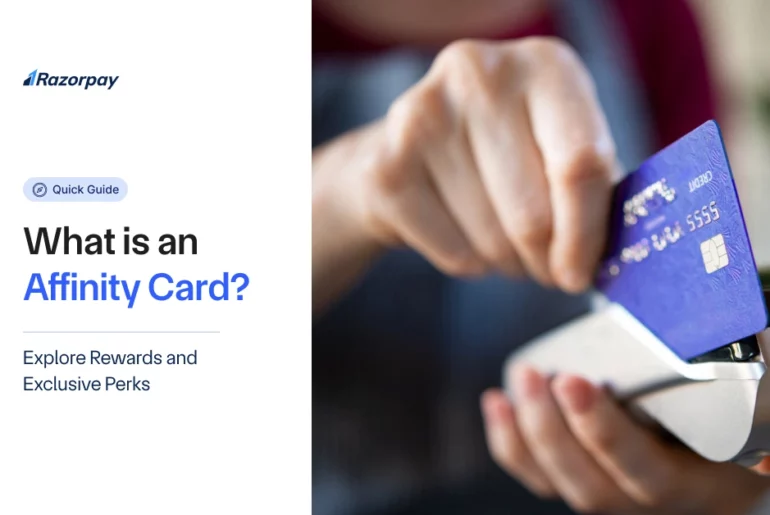An affinity card is a type of credit card linked to charities, nonprofit organisations, or specific groups like universities or sports clubs. It allows you to support a cause you care about while managing your day-to-day expenses. These cards are gaining popularity among cause-driven consumers.
Many affinity card programs work by giving a small percentage of every transaction you make to the partner organisation, typically at no extra cost to you. Many universities, sports clubs, and charities offer affinity cards, making it easy for supporters like you to contribute.
Table of Contents
What Is an Affinity Card?
An affinity card is a credit card linked to a specific organisation, such as a charity, university, or sports club. Every time you use the card, the bank donates a very small percentage of your transaction amount to the affiliated organisation. This donation comes from the bank’s earnings, meaning you can support your favourite cause without any extra cost to yourself.
Important Key Takeaways
- Affinity cards are credit cards tied to a particular charity or organisation.
- The bank, not the cardholder, makes donations from its earnings with each card transaction.
- These cards allow nonprofits and organisations to raise funds passively without requiring direct donations from supporters.
- Some affinity cards also come with perks like cashback, travel rewards, or discounts, adding more value to your spending.
How Does an Affinity Card Work?
Affinity cards are the result of collaborations between banks and organisations, such as charities, universities, or sports clubs. Banks issue the cards on behalf of the organisation, which selects the cause or initiative it wants to fund, like scholarships, research, or community welfare projects.
When you use an affinity card for purchases, the bank donates a small percentage of your transaction amount to the affiliated organisation. This means that without spending anything extra, you help contribute to your chosen cause.
For example, a university might offer an affinity card to its alumni, directing the funds toward student development. Similarly, charity-affiliated cards could raise money for disaster relief, education, or healthcare.
Benefits of Using an Affinity Card
1. Passive Income for Organisations:
Affinity cards provide a steady, passive income stream to the partner organisation. Each time you use the card, a small percentage of the transaction amount is donated to support the cause. Over time, this can help fund initiatives such as scholarships, sports development, or charitable projects.
2. One-Time Sign-Up Bonuses:
Organisations may also receive a one-time payment from the bank for every new cardholder who signs up. This adds an immediate financial boost that supports their programs.
3. Rewards and Incentives for Cardholders:
Many affinity cards come with perks that benefit you as well. Depending on the card, you could earn cashback, travel rewards like bonus miles, or discounts on select purchases.
Drawback of Using an Affinity Card
1. Minimal Donations:
The donations made to partner organisations are often quite small, typically around 0.05% of each purchase. This means that unless you use the card frequently or make large transactions, the overall contribution may be modest.
2. No Tax Benefits:
Unlike direct charitable donations, the contributions made through an affinity card are not tax-deductible for cardholders since the bank, not you, is making the donation.
3. Limited Rewards:
Compared to standard rewards or cashback credit cards, affinity cards may offer less valuable perks. You might earn fewer points, miles, or cashback than you would with other types of credit cards.
4. Partnership Risks:
If the bank’s partnership with the organisation ends, you could lose access to the affinity card and any associated rewards. In such cases, you may have to apply for a new card, which could disrupt your contributions and benefits.
Things to Keep in Mind About Affinity Cards
1. Evaluate the Organisation:
Check the credibility of the partner organisation. Ensure that the cause resonates with you and that the funds raised through the card are being utilised transparently and effectively.
2. Understand the Donation Percentage:
While affinity cards donate a percentage of your spending, the amount is often small (around 0.05% per transaction). This is more effective if you plan to use the card frequently or for large purchases.
3. Compare Rewards:
Affinity cards may offer rewards like cashback, discounts, or air miles, but these perks are often less competitive than standard rewards cards. If maximising rewards is your priority, you might want to weigh your options carefully.
4. Check Fees and Interest Rates:
Review the card’s annual fees, interest rates, and other charges. Some affinity cards may come with higher fees, which could offset any benefits you gain from donations or rewards.
Affinity Cards Examples & Real-Life Cases
1. IRCTC SBI Platinum Card
This Card is a notable example in India. Offered in collaboration between the State Bank of India and the Indian Railway Catering and Tourism Corporation (IRCTC), this card aims to enhance the travel experience for frequent railway passengers.
Cardholders enjoy benefits such as cashback on railway bookings made through IRCTC, rewards points, and access to exclusive offers. This affinity card is designed to cater specifically to individuals who prioritise railway travel, aligning with their lifestyle needs while supporting IRCTC’s services.
2. Amazon Pay ICICI Bank Credit Card
ICICI Bank has partnered with Amazon Pay to offer a co-branded affinity card designed to enhance the online shopping experience. This card rewards users with cashback on Amazon purchases and payments made through Amazon Pay.
Prime members enjoy 5% cashback on Amazon purchases, while non-Prime users receive 3%. With no joining or annual fees, this card enhances the online shopping experience while supporting the bank’s digital payments initiative.
Conclusion
Affinity cards offer a convenient way to support meaningful causes while managing your everyday expenses. These cards also provide perks such as cashback, discounts, or travel rewards, though their rewards may be less competitive than other credit cards. However, the donations per transaction are often minimal, and the contributions are not tax-deductible for cardholders.
Despite these limitations, affinity cards remain an appealing option for those who want to make a positive impact passively. Whether you’re supporting a local charity, educational institution, or sports club, affinity cards combine everyday financial convenience with the satisfaction of contributing to causes that matter.
Frequently Asked Questions (FAQs):
1. What does the affinity card do?
An affinity card is a credit card linked to a charity, nonprofit organisation, or group like a university or sports club. Every time you use the card, the bank donates a small percentage of your transaction amount to the affiliated organisation, helping you support a cause without extra cost.
2. What is the meaning of affinity name in credit cards?
Affinity names on credit cards signify partnerships between financial institutions and organisations, such as charities or companies. These names reflect the branding and shared benefits of these collaborations, often supporting specific causes or communities.
3. What are the unique features of an affinity card?
Key features of affinity cards include automatic donations from the bank based on your spending, potential rewards like cashback or discounts, and the ability to support charities, universities, or clubs without making direct donations.
4. How do I activate my Affinity card?
To activate your affinity card, follow the instructions provided by the issuing bank. This may involve activating it through online banking, the bank’s mobile app, or a phone call to a designated activation number.
5. What is an affinity rewards card?
An affinity rewards card is a type of credit card linked to a specific organisation, like a charity or professional group. Cardholders can earn rewards or benefits while supporting the partnered organisation, often with a portion of spending contributing to its cause.
6. Who can apply for an affinity card?
Anyone who meets the eligibility criteria set by the issuing bank can apply for an affinity card. Typically, applicants need to meet income requirements, have a good credit score, and submit the necessary documents.
7. Can I earn loyalty points or discounts with an affinity card?
Yes, many affinity cards offer loyalty points, cashback, or discounts in addition to their cause-based contributions. However, the rewards may be less competitive compared to standard rewards cards.



